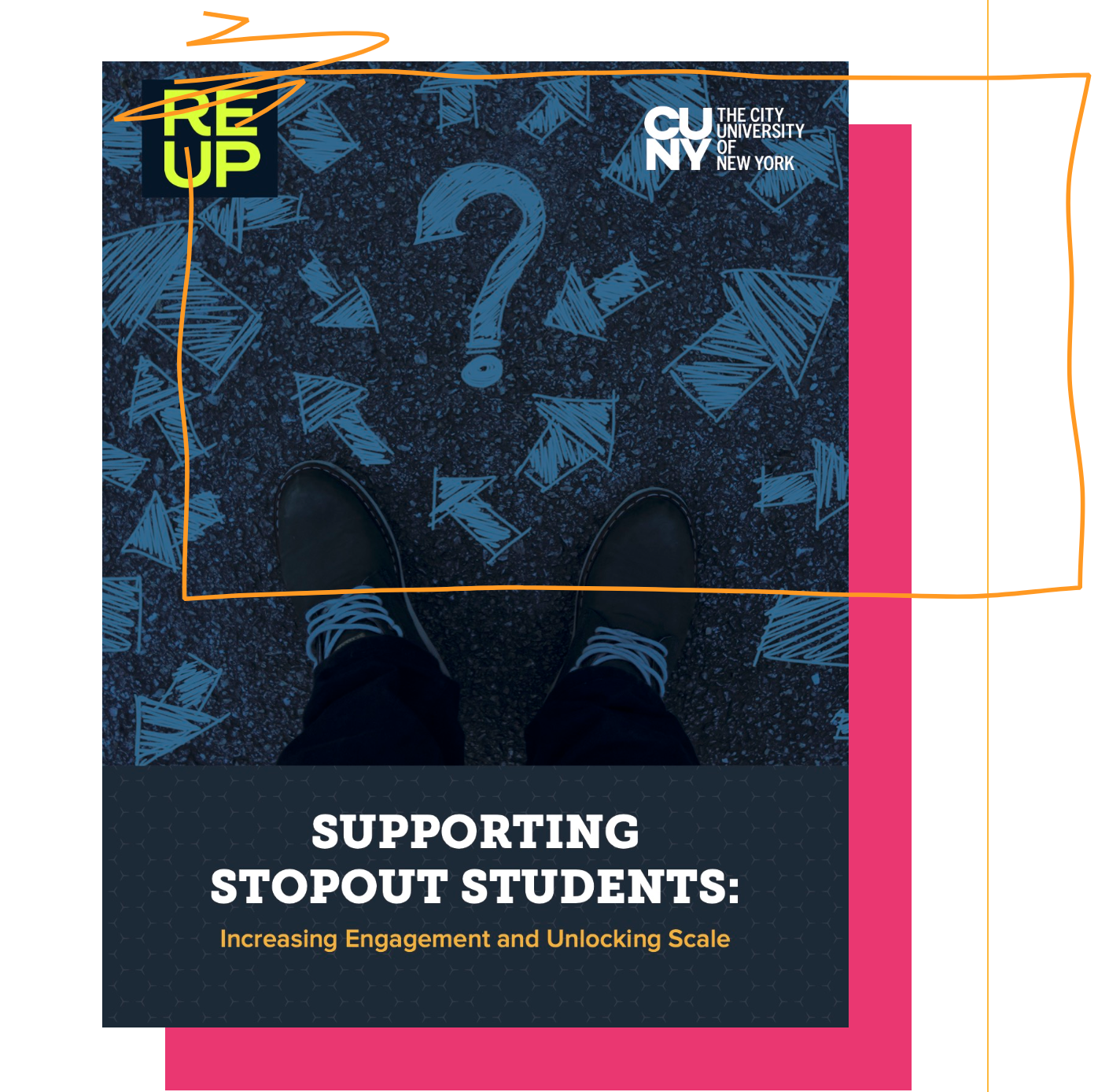New Report: Supporting Stopout Students
More Americans are going to college than ever before, but only 58% of four-year students graduate within six years. The rest — who are disproportionately low-income, first-generation, and/or students of color— will not finish a degree; they’ll stop out. Stopping out has significant implications for lifelong earning power. Student debt accumulation exacerbates the earning loss; students who stop out typically face the worst of all worlds, debt without a credential to help them earn their way out. Because of the additional barriers they face in returning and graduating, stopout students require support that looks fundamentally different from the traditional student.
ReUp Education was founded to empower the millions of Americans who stop out to find pathways to graduation. In late 2017, we received a generous grant from the Bill & Melinda Gates Foundation to expand our work in serving stopouts. The goals of the grant were twofold:
- To create a testbed for innovations that lower the cost of our interventions without sacrificing student outcomes, making a ReUp partnership more accessible to all schools, regardless of their resources.
- To document practices, policies, and insights gleaned from this real world laboratory that inform leadership and enrollment management teams from other institutions of higher education in supporting stopped out students in reenrolling and graduating.

We launched the pilot in the late spring of 2018 with the City University of New York (CUNY). CUNY’s diverse student body, commitment to supporting stopout students, and multi-campus system made them an ideal partner.
Our report presents findings from an eighteen-month collaboration between ReUp Education and the City University of New York (CUNY) to refine, develop, and test affordable technology-based innovations to help stopouts re-enroll and graduate.
A summary of key findings from the report is presented below.

Increasing Engagement
Improving Student Contact Data: Student contact information is often not current. Augmenting this information with additional data sources enabled us to acquire new contact data for an additional 2,744 students. The enhanced information improved overall reach rate by 4.7% and the response rate by 3.5%. 6.2% of the data-enhanced students reenrolled.
Diversify Communication Channels: Invest in emergent media and communication channels that engage students where they are, catch their attention, and help keep your organization relevant. For example, students receiving video ads engaged with ReUp ads at a rate 10% higher than those that received only static image ads.
Colloquial Communication: We tested the efficacy of emojis within automated text nudging as a means to check in with and survey students about their plans for the following term. Using emojis generated increased response rates by 42% and 30% respectively.
Text-based Coaching Works: We observed a substantial change both in the types of information students were sharing with coaches via text messages and in the number of text messages being exchanged. By examining the data, we determined texting served an important role in strengthening coaching relationships and providing meaningful student support.

Unlocking Scale
Automated Student Prioritization and Proactive Support: Through a suite of improvements, including automated prioritization and proactive student support, we were able to increase coaching capacity by 50% from our pre-CUNY baseline. Additionally, we learned that using technology to scale student outreach and support is not at odds with relationship development. Automated prioritization enables staff to efficiently support more students without sacrificing outcomes or relationship development.
Key Relationships: The quality of students’ relationships (e.g. self, family, university, work, coach) can enable or inhibit success. Students assessed to have more positive relationships were more successful in coming back and persisting. Coaching was able to influence the health of these relationships over time; as student participation in coaching increased, the health of their relationships also increased, leading to a greater likelihood to reenroll.
Predicting Outcomes: Through machine learning we were able to predict a student’s likelihood to engage in coaching and reenroll in school. This ability allowed for both automated and human service delivery to be improved. While many schools are likely already using similar models to retain first-time students, we recommend that they consider applying these techniques to their stopout populations.
The full report is available for download below
Then, now, and beyond
We've helped more than 50 partners support tens of thousands of adult learners, and we're not stopping there. We're on a mission to support millions of adult learners reach their goals of going back to school.
21,500
Re-enrolled in college
$59.9M
In tuition recaptured
5,000
Graduated to-date